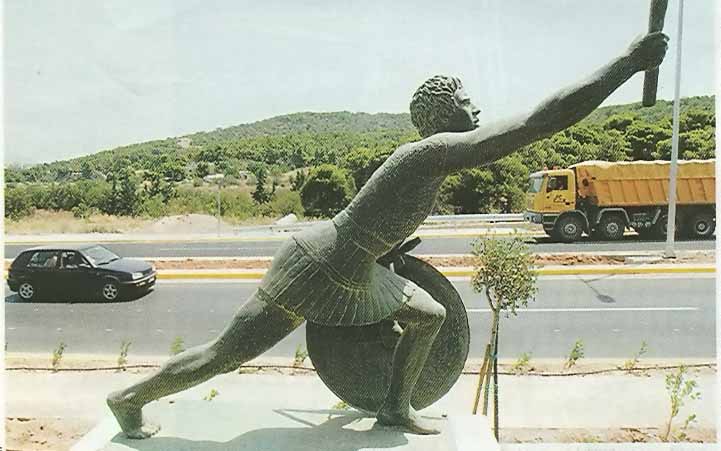 |
||
|
Pheidippides' Heroic Journey Athens News By J D Muhly* The Athenian Pheidippides did run an impressive distance in ancient times, but it wasn' t from Marathon to Athens |
||
|
THE SPIRIT of Pheidippides certainly lives on in the 2004 Olympic Games in Athens (and other parts of Greece). There is a modern bronze statue of Pheidippides in the town of Rafina (alongside the Marathon Road) and the Athletic Association of Marathon has taken Pheidippides as its official name. All this is very much in the spirit of the great revival of the Olympic Games that took place in 1896. By that time the image of a heroic long-distance runner (in ancient Greek a hemerodromos) named Pheidippides, who ran from Marathon to Athens to announce to his fellow Athenians their great victory (in 490 Be) over the Persian forces on the plain of Marathon, was firmly entrenched in the popular imagination. Upon making his announcement he promptly expired, only increasing his popular appeal. |
 The statue of Pheidippides is seen at the marathon route in the port of Rafina, northeast of Athens. The race is named after the legendary Pheidippides, who ran from Marathon to Athens to announce the Greek victory over Persian invaders in 490 BC
|
|
|
For that revival of the ancient games the Baron Pierre de Courbertin decided that the scheduled events should include a marathon run, from Marathon to Athens, in the spirit of the great Pheidippides, with the winner being awarded a silver cup. Obviously no one could argue that such a race had been part of the original Olympic Games, said to have begun in 776 Be. The baron's decision to include a marathon race must certainly have been influenced by the extremely popular poem by Robert Browning, entitled Pheidippides, published in 1879. The poem, in turn, must have been inspired by the statue of Pheidippides created by the French sculptor Cortot in 1834 (called Le Soldat de Marathon) and erected in the gardens of the Tuilleries in Paris. |
||
| So far so good. We can trace a tradition of Pheidippides, the great Marathon runner, through the 19th century and extending into the 18th. But what about Antiquity? What about 490 BC itself, and the centuries thereafter? | ||
|
Was there an ancient tradition about Pheidippides, the Marathon runner who brought the news of the great victory over the Persians and then promptly dropped dead, in true heroic fashion? Alas, the ancient sources know nothing about such an event. As far as we can tell, on the basis of the surviving ancient historical sources, no one ever ran from Marathon to Athens. We know of many famous long-distance runners but not one of them ever seems to have covered the distance from Marathon to Athens, let alone in 490 Be. So who is Pheidippides and how do we account for his heroic accomplishments that have played such a role in modern European history? |
||
|
To answer that question we must begin with the Histories of Herodotus, the single most important source for our knowledge of Greek history prior to the mid-fifth century BC. Herodotus knew all about a Pheidippides (or Phidippus or Philippides, the manuscripts give all three spellings, a problem that need not concern us here), a long-distance runner who was charged by his fellow Athenians to run from Athens to Sparta, a distance of about 245 km, in order to persuade the Spartans to join Athens in the fight against the invading Persian army. Pheidippides arrived in Sparta the following day, a phenomenal feat of endurance running, only to be told by that the Spartans that they were in the midst of the celebration of an important religious festival, the Carneia, and could not possibly take any action before the full moon. Thus, despite the heroic run by Pheidippides, the Spartans were of no use in helping the Athenians defeat the Persians at Marathon in 490 BC. |
 Markus Thalmann of Austria wearing an olive wreath after winning the Spartathon, on 27 September 2003, poses in front of the statue of Leonidas near the finish line. Thalmann finished the race in 23 hours 28 minutes and and 24 seconds |
|
|
That is it, as far as Herodotus is concerned. Pheidippides made a heroic run from Athens to Sparta, in two days, all to no avail. So why do we now have the tradition of a Pheidippides who ran from Marathon to Athens, and what does this distance, of some 26 miles or 42 km, have to do with the modern marathon race that has been part of the Olympic Games since 1896? Tradition, as all historians know, is a very tricky concept. The Greek organisers of the 2004 Olympic Games have placed great emphasis upon the concept of the Olympic Torch, beginning with an impressive torch-lighting ceremony at ancient Olympia and followed by a remarkably impressive sequence of events involving the Olympic Torch being carried by prominent individuals in almost all the countries of the modern world. But what does the Olympic Torch have to do with the ancient Olympics? Nothing whatsoever. The concept of the Olympic Torch only goes back to 1936, to the Berlin Olympics held in Hitler's Germany. Does, this really make a difference in how the concept of the Olympic Torch, the idealism of the symbol, is to be appreciated in 2004? Not really. What matters is the way in which the symbol is evaluated and appreciated by its contemporary audience. The Greek organisers have managed to convince the world that the Olympic Torch is a potent symbol of the ancient Olympic spirit and that is really all that matters. The rest is best left to scholarly books and articles. So what about poor Pheidippides and his (non-existent) run from Marathon to Athens? If such a run never took place in ancient times are we then to abolish all so-called Marathon runs, in the Olympics, in New York City, Boston and other parts of the world? Well, obviously not; the mere suggestion of such a thing belongs to the realm of the absurd. Everyone is having such a wonderful time training, preparing and running in various marathon races around the world that they are never going to give it up. What was the single most important event in the 1896 Olympics? The answer is obvious: the victory by Spyros Louis in the marathon race. That fact alone guaranteed that the Marathon race was going to be the most significant event in all future Olympic Games. And, if one looks hard enough, it is even possible to find justification for a marathon run in our ancient sources. The Greek writer Lucian, active in the mid-second century AD, produced a series of satires and parodies on the writing of history. His True History contains nothing of any historical value whatsoever, but he had a great time making fun of the serious writers of his day. Lucian is the author of a short work whose title can be translated something like "On those who fell while presenting a message of greeting". From the title alone we can tell that this theme, of an individual who expired during the course of duty, had become a popular literary subject by the second century AD. Lucian tells the following tale: "Philippides the hemerodromos, reporting the victory from Marathon to the archons, Who were seated anxiously awaiting the result of the battle, said, , rejoice, we have won,' and saying this, died at the same time as his report, expiring with the salutation." So here we actually have, in a totally non-historical context, Philippides/Pheidippides Pheidippides, the Marathon runner. What no one has tried to do is to trace the subsequent history of this literary theme, from the second to the nineteenth century AD. And what about the length of a marathon run? According to Prof. Stephen Miller, in his new book on Ancient Greek Athletics (Yale University Press, 2004), the canonical distance of 42.2 kilo metres, or 26 miles 385 yards, was established only in the 1908 Olympics, held in London. It represents not the distance from Marathon to Athens but the distance from Windsor Castle to the Olympic stadium in London. *Jim D Muhly is an archaeologist and former director of the American School of Classical Studies in Athens |
||
HCS readers can view other excellent articles by in the News & Issues and especially the sections of our extensive, permanent archives at the URL http://www.helleniccomserve.com./contents.html
All articles of Athens News appearing on HCS have been reprinted with permission. |
||
 |
||
|
|
||
|
2000 © Hellenic Communication Service, L.L.C. All Rights Reserved. http://www.HellenicComServe.com |
||
